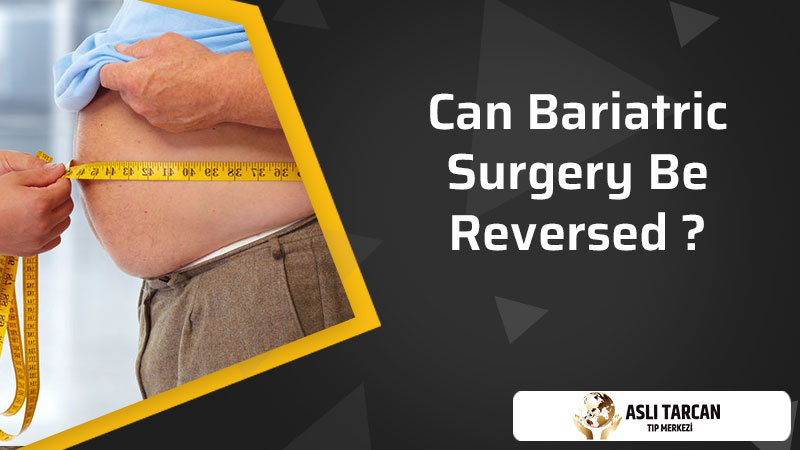Can Bariatric Surgery Be Reversed As the fat culture has grown, bariatric surgery has become more frequent. Can Bariatric Surgery Be Reversed? Anyone who conducts studies on the subject and decides to have or undergo bariatric surgery is likely to have similar concerns. It’s tough to rely so much on the outcomes of surgery conducted by a variety of techniques, orientations, and physicians. This is especially important if you wish to lose weight. Due to mistakes and unskilled hands, the outcomes of bariatric surgery may be dismal. As a result, people’s opinions may not necessarily reflect those that care about the environment. We’ll look at the difficulties of surgery and fat culture in this article. Let’s start with a definition of obesity. What are the procedure steps? What is the risk level? Let’s take a closer look at this.
First, What Is Obesity?
What Is Obesity?
Obesity is a complex disease. Also, the typical excess of bodily fat. Obesity is more than just a cosmetic concern. You are more prone to developing other diseases and health issues as a result of this medical condition, such as heart disease, type 2 diabetes, high blood pressure, and some forms of cancer. Some people struggle to avoid obesity for a variety of reasons. The good news is that even small weight loss can aid or prevent obesity-related health problems. Dietary adjustments, increased physical activity, and behavioral changes can all help with weight loss. Prescription medications and weight-loss surgery are also options for treating obesity.
Symptoms of Obesity?
However, if your body mass index (BMI) is 30 or more, you are obese. To get your BMI, multiply your weight in pounds by your height in inches, and then multiply by 703. Substitute your weight in kilograms for your height in meters squared. For the vast majority of people, BMI provides a reasonable estimate of body fat. However, because BMI does not directly measure body fat, certain people, such as strong athletes, may have a BMI in the obese category while having no excess body fat. As a result, measuring body fat is always a good technique for establishing obesity.
What About The Details Of Bariatric Surgery?
What Is Bariatric Surgery?
Bariatric surgery, which includes gastric bypass and other weight-loss operations, involves altering your digestive tract to help with weight loss. Weight reduction surgery is an option for people who have tried diet and exercise without success or who are experiencing significant health concerns as a result of their weight. Some medicines limit the amount of food you can eat. Also, some approaches are capable of accomplishing both goals. Weight-loss surgery, whether bariatric or not, has significant risks and adverse effects. To determine the long-term efficacy of bariatric surgery, you must also make lasting dietary modifications and engage in regular physical exercise.
Who Is For Bariatric Surgery?
Having a body mass index (BMI) of 30 or above means you are obese. To get your BMI, multiply your weight in pounds by your height in inches, and then multiply by 703. Substitute your weight in kilograms for your height in meters squared. For the vast majority of people, BMI provides a reasonable estimate of body fat. However, because BMI does not directly measure body fat, certain people, such as strong athletes, may have a BMI in the obese category while having no excess body fat. As a result, measuring body fat is always a good technique for establishing obesity.
The Variance Of Surgeon Risks!
Like any major therapy, bariatric surgery has considerable health risks, both short and long term. Excessive bleeding, infection, poor anesthetic reactions, blood clots, lung or breathing problems, gastrointestinal leakage, and death are potential hazards. Also, weight-loss surgery has different long-term dangers and effects depending on the technique. There is a possibility of bowel obstruction, dumping syndrome (diarrhea, flushing, lightheadedness, nausea, or vomiting), gallstones, hernias, low blood sugar, malnutrition, ulcers, vomiting, acid reflux, and death.
Can Bariatric Surgery Be Reversed?
Bariatric surgery is a catch-all phrase for procedures that help you lose weight by modifying your digestive system. Although the majority of these weight-loss procedures have favorable outcomes, the side effects might be so severe that the patient wants to reverse the procedure. If you have had bariatric surgery or are considering it, you may be wondering if the operation is reversible. This article covers whether reversal is a possibility for various types of bariatric surgery and whether reversing a weight-reduction operation is safe. The best of reading.
Determinity : Can Bariatric Surgery Be Reversed?
A Gastric bypass reversal is a type of surgery that focuses on restoring the patient’s stomach and intestines to their original positions. Because of the differences in each bariatric surgery, it is feasible to reverse certain operations but not others. A reversal, on the other hand, has a higher risk of complications that might result in life-threatening diseases. It is critical to remember that weight gain and other obesity-related problems are likely to develop following reversal. This may be quite hazardous in the future. But, with luck, it is feasible.
What If : Can Bariatric Surgery Be Reversed?
So, what if? As if irreversible surgerial operations, especially if a portion of the stomach was cut out during the process. When compared to surgeries that reroute the digestive system or cut out a piece of the stomach, bariatric surgery treatments that utilize a device such as a band or intragastric balloon may have fewer chances of reversal. This should be important for the patient.
What Is The Final Result Of Can Bariatric Surgery Be Reversed?
When it comes down to it, decreased blood flow and scar tissue formation are two factors that add to the complexity and risk of reversing bariatric surgery. Despite the fact that there are numerous potential hazards, a few studies on surgery reversal show that patients who received the therapy had better results. The rationale is straightforward. Re-operating on tissue that has previously been subjected to a surgical procedure not only destroys the affected tissues but also increases the risk of bleeding. Previous surgery scar tissue also makes it harder for operating physicians to view or access normal tissue. This also makes it more difficult for staple lines and suture lines to heal correctly following a repeat operation. We wish you a happy and healthy day.
How Long After Bariatric Surgery Can You Have Caffeine and How Much Per Day?
Caffeine is a popular stimulant in coffee, tea, energy drinks, and many other beverages and foods. After bariatric weight loss surgery, limit your caffeine intake to keep your weight loss on track and prevent any adverse side effects; but how long after bariatric surgery can you have caffeine? Patients should wait at least three months after their surgery before reintroducing caffeine into their diet. This is because the surgery can affect how caffeine is metabolized in the body, resulting in side effects such as jitteriness, headaches, and even insomnia.

Remember that everyone is different, and while some people may be able to tolerate caffeine sooner after surgery than three months, others may need to wait longer. Be mindful of your intake when reintroducing caffeine into your diet after bariatric surgery, and speak with your doctor or dietitian first to discuss your individual needs. Caffeine can stimulate hunger and increase cravings for sweet and salty foods, which can derail your weight loss progress. Aim to limit yourself to no more than 200 milligrams of caffeine per day, or about two 8-ounce cups of coffee. Avoid sugary, caffeinated beverages and opt for plain coffee or tea. We hope this article was useful in answering “how long after bariatric surgery can you have caffeine?”



